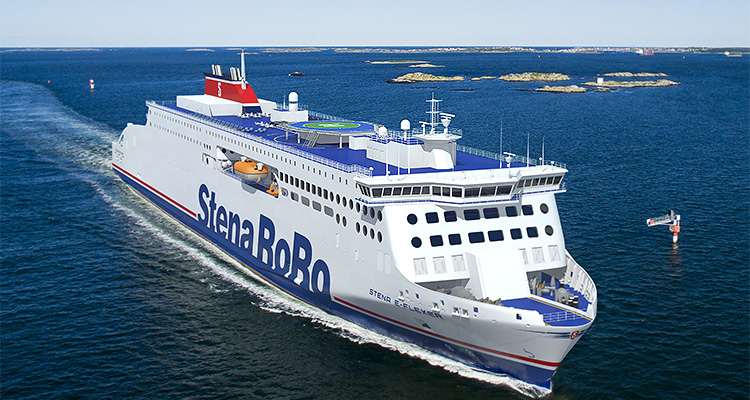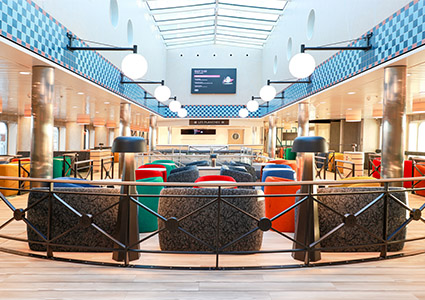
Stena RoRo leads the change in eco-friendly vessel innovation and fleet modernization
Stena RoRo is a fully integrated part of the family-owned group Stena AB. The company was one of the first participants in the roll-on/roll-off (RoRo) market. Managing Director, Per Westling, shares an overview: “The group, headquartered in Sweden, has a broad range of interests, including recycling, real estate, ferries, and tankers, as well as offshore drilling ships. We are a separate entity that operates in the same sector as our sister company, Stena Line, which, by some metrics, is one of the largest ferry operators in the world. They have over 40 vessels traveling over 18 routes throughout Europe, with the recent addition of a route between Europe and Africa.
“We work with the same types of ships but in a completely different way. We do not operate ships or sell freight or passenger tickets. We sell and charter ships. Thanks to our substantial experience, we are able to lend our expertise in the ship buying and selling business to our sister company, should they need to sell a ship, for example. The other significant part of our business is acquiring new-build ships. We design and order new ships, working with consultants and shipyards. Since 2016, for example, we have been completing an order for 17 vessels, of which we have already received 12.
Thanks to our substantial experience, we are able to lend our expertise in the ship buying and selling business to our sister company, should they need to sell a ship, for example. The other significant part of our business is acquiring new-build ships. We design and order new ships, working with consultants and shipyards. Since 2016, for example, we have been completing an order for 17 vessels, of which we have already received 12.
“These ships are part of the E-Flexer line. This highly customizable range consists of hybrid ships with engines designed to run on alternative fuel, as well as a modular design that combines passenger and freight needs. This provides a standardized platform for customers to develop according to their needs.
“Another crucial component of our business is working not only with our sister company but also with external ferry operators. As long as they are not competing directly with our own ferry company, we order ships to charter out on both long-term and short-term bases. For example, we provide vessels for DFDS and Brittany Ferries.
“We’ve become known as a valuable supplier of new passenger/cargo ships in our segments. With the new technology and the flexibility of the concept, we can utilize several different fuels, from traditional fuels to methanol and LNG, as well as batteries for hybrid configurations. We recently delivered two vessels for Brittany Ferries to operate out of Portsmouth, which have sufficient batteries to navigate the Channel without the aid of the main engines for up to an hour. From an environmental point of view, the improvement in battery technology even in the last five years is very significant.”
Industry innovation
Per then reflects on what it takes to become a market leader in climate-neutral transport concepts: “First, you need to have the capacity, the skillset, and the resources to develop new technologies. You cannot purely rely on buying solutions from suppliers. You also need to know how to integrate these technologies into a vessel design.
“Electrification is where we see the largest impact on the environmental effect of the vessels. It is significantly more efficient than e-fuels; with batteries, you can achieve around 90-to-95 percent efficiency, whereas with e-fuels, that number is closer to 30 percent. We think that everything that can be electrified should be. Batteries can not only supply what we call the domestic consumption, which includes things like the lights and galley, but also the mechanical drive of the vessel. We can deliver energy to the propeller shafts that can provide enough power to take the ship to 20 knots.
“In the future, when batteries become cheaper, lighter, stronger, and safer, we will be able to install more units, which will enable the operation of our vessels based purely on battery power. We are also looking into other ways to electrify vessels, such as retrofits. We have begun implementing battery packs, including containerized solutions, which can take care of the domestic load and the heating of the ship.”
 Per then reflects on some of the challenges facing the decarbonization of shipping: “Charging capacity is definitely a limiting factor. For example, for the Guillaume de Normandie and Saint Malo, which are chartered by Brittany Ferries, a high-powered charging facility has been installed by the port in Portsmouth. This represents a significant investment; delivering 11,000 volts requires new cables, transformers, and other equipment capable of handling the load. Hybrid ships are also not cheap; Brittany Ferries, for instance, has invested significant funds to be at the forefront of the industry.”
Per then reflects on some of the challenges facing the decarbonization of shipping: “Charging capacity is definitely a limiting factor. For example, for the Guillaume de Normandie and Saint Malo, which are chartered by Brittany Ferries, a high-powered charging facility has been installed by the port in Portsmouth. This represents a significant investment; delivering 11,000 volts requires new cables, transformers, and other equipment capable of handling the load. Hybrid ships are also not cheap; Brittany Ferries, for instance, has invested significant funds to be at the forefront of the industry.”
Fleet efficiency
Per then outlines the company’s ambitions for the year ahead and beyond: “The major focus will be continuing to expand our broader fleet as well as the E-Flexer series. We will also be taking steps to continue generating new client relationships, and we will continue to integrate the latest technologies to improve the ecological impact and efficiency of our fleet. This year, for example, we will receive delivery of two further ships from our Chinese shipyard, so we will be busy taking care of those orders.
“We are in the very lucky position that the majority of our clients are very stable, but the world around us is more complex than ever and increasingly insecure. We are unsure how this will affect our markets, especially short term, but fluctuations in the global economy always have consequences for shipping. Different economic parameters will affect how much cargo flows between locations. It is not easy to predict. Ship investments are, however, long term commitments and matters like decarbonization will play a more important role further ahead.
“Within the next five years, the business will have to adapt to the European Union’s FuelEU Maritime regulations which will update in four years. We will have to replace six percent of the fossil fuels we burn with alternatives. In this timeframe, we expect to see a significant strengthening of the development of technological solutions for existing ships and new builds. We also foresee an increase in battery installation as well as an uptick in the use of e-fuels. Also, we are likely to see recent policy decisions taken by the IMO significantly affecting our business going forward.”